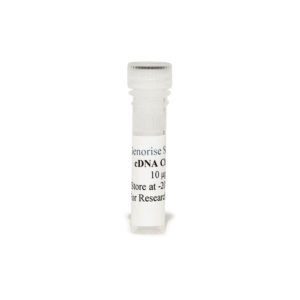Recombinant Human NOX4 Protein
$99.00 – $456.00
The recombinant human NOX4 protein is derived from in vivo expression of human NOX4 gene in E. coli and purified using his-tag affinity column and can be used in multiple applications such as cell culture, ELISA and western blot.
Alternative names for NOX4: NADPH oxidase 4 (NOX4)
This product is for Laboratory Research Use Only not for diagnostic and therapeutic purposes or any other purposes.
- Description
- Product Citations
- Reviews (0)
Description
Genorise Recombinant Human NOX4 Protein Summary
Alternative names for NOX4: NADPH oxidase 4 (NOX4)
Product Specifications
| Purity | > 97%, by SDSPAGE under reducing conditions and visualized by silver stain. |
| Endotoxin Level | < 0.1 EU per 1 μg of the protein by the LAL method. |
| Activity | na |
| Source | E. coli derived human NOX4. |
| Accession # | Q9NPH5 |
| N-Terminal Sequence Analysis | Ser |
| Amino Acid Sequence | Ser401-Ser538 |
| Predicted Molecular Mass | 31 kDa |
| SDS-PAGE | 31 kDa, reducing conditions |
Background:
NADPH oxidase 4 (NOX4) is an enzyme that in humans is encoded by the NOX4 gene, and is a member of the NOX family.[1] Oxygen sensing is essential for homeostasis in all aerobic organisms. A phagocyte-type oxidase, similar to that responsible for the production of large amounts of reactive oxygen species (ROS) in neutrophil granulocytes, with resultant antimicrobial activity, has been postulated to function in the kidney as an oxygen sensor that regulates the synthesis of erythropoietin in the renal cortex. Nox4 protects the vasculature against inflammatory stress.[2] Nox-dependent reactive oxygen species modulation by amino endoperoxides can induce apoptosis in high Nox4-expressing cancer cells.[3] cytoplasmic NOX2 and nuclear NOX4 expression is upregulated during hepatocellular carcinoma development. In particular, NOX4 translocation into the nucleus may affect the development and progression of hepatocellular carcinoma.[4] Tubular NOX4 expression decreases in chronic kidney disease but does not modify fibrosis evolution.[5] hypoxia induces HK-2 cell apoptosis through a signaling pathway involving TGF-beta1 via Smad pathway induction of Nox4-dependent reactive oxygen species generation.[6] NOX4 showed an anti-inflammatory role for Nox4 in macrophages and Nox4 deficiency results in less M(IL4+IL13) polarization and suppression of NFkappaB activity in monocytes.[7] The activated p38 pathway is at least partially mediated by NOX-4 in diabetic nephropathy in humans and in a rat model.[8]
References
- Cheng G et al. (2001) Gene 269 (1-2), 131-140.
- Schröder K, et al. (2012). Circ. Res. 110 (9): 1217–25.
- Zhu P, et al. (2013). Cell Death Dis. 4 (3): e552. doi:1038/cddis.2013.68.
- Eun HS, et al. (2019) Pathology 51 (6), 579-585.
- Rajaram RD, et al. (2019) Redox Biol 26, 101234.
- Cho S, et al. (2019) PLoS ONE 14 (7), e0219483.
- Helfinger V, (2019) Oxid Med Cell Longev 2019, 3264858 (2019).
- Cui FQ, et al. (2019) J Diabetes Res 2019, 2981705 (2019).
Product Citations
Be the first to review “Recombinant Human NOX4 Protein”
You must be logged in to post a review.

























Reviews
There are no reviews yet.